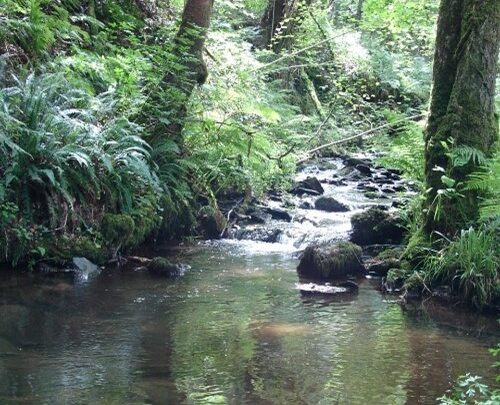Woodlands and Rivers need each other
 On many hills and uplands in the UK where soil quality is low, foresters have to bring in rock phosphate from Morocco in order to get their spruce trees to grow. This is hugely expensive, expending enormous energy in mining and transport to help establish plantations. Researchers in Canada found that salmon in mountain rivers contain a high level of phosphate which they have absorbed from the sea while migrating. Salmon are eaten in large numbers by bears and eagles which then deposit the phosphate throughout the surrounding forests. Similar research in Scotland has established that Osprey fulfil the same function, catching salmon in upland streams and then spreading high phosphate poo across the surrounding trees. The quantity of phosphate spread works out at several kilos per hectare every year, which over time is more than enough to make the trees grow. So if we want to have healthy forests we also need to have lots of healthy salmon and ospreys as well. How frightening that we have let our natural environment become so degraded that we knew nothing about the natural phosphate cycle that had supported our forests for millions of years. One wonders what other vital natural support systems have been destroyed by our overexploitation of our environment, and yet we remain ignorant of our own depravity.We have very few salmon in our rivers these days and even fewer ospreys. Recent figures from the Environment Agency show that only 14% of rivers in England are in good ecological condition. That means that 84% are polluted in one way or another, so we have a really long way to go to save the salmon. At least we now realise that conservation and habitat restoration on a large scale pay very high dividends.
On many hills and uplands in the UK where soil quality is low, foresters have to bring in rock phosphate from Morocco in order to get their spruce trees to grow. This is hugely expensive, expending enormous energy in mining and transport to help establish plantations. Researchers in Canada found that salmon in mountain rivers contain a high level of phosphate which they have absorbed from the sea while migrating. Salmon are eaten in large numbers by bears and eagles which then deposit the phosphate throughout the surrounding forests. Similar research in Scotland has established that Osprey fulfil the same function, catching salmon in upland streams and then spreading high phosphate poo across the surrounding trees. The quantity of phosphate spread works out at several kilos per hectare every year, which over time is more than enough to make the trees grow. So if we want to have healthy forests we also need to have lots of healthy salmon and ospreys as well. How frightening that we have let our natural environment become so degraded that we knew nothing about the natural phosphate cycle that had supported our forests for millions of years. One wonders what other vital natural support systems have been destroyed by our overexploitation of our environment, and yet we remain ignorant of our own depravity.We have very few salmon in our rivers these days and even fewer ospreys. Recent figures from the Environment Agency show that only 14% of rivers in England are in good ecological condition. That means that 84% are polluted in one way or another, so we have a really long way to go to save the salmon. At least we now realise that conservation and habitat restoration on a large scale pay very high dividends.
We are fortunate enough to have the Lynher River Association to pay attention to the salmon population in the river, and re-stock it on a regular basis, ensuring that it is one of the few rivers were the population is not in decline. We can all do our bit by not disturbing the river bed through too much paddling, and keeping dogs out of the river particularly along the Broadwood and Treovis river banks. The Stara working parties regularly stack brash along these banks to deter access to the river – please don’t remove these natural barriers, especially as you know what they are there for. In this era of Climate emergency, it’s even more important to be aware of any negative impact we can have on the woods and the river and do our best to avoid it. Here’s a photo of Shales Brook, the tributary that enters our beautiful stretch of the River Lynher in Treovis Wood
